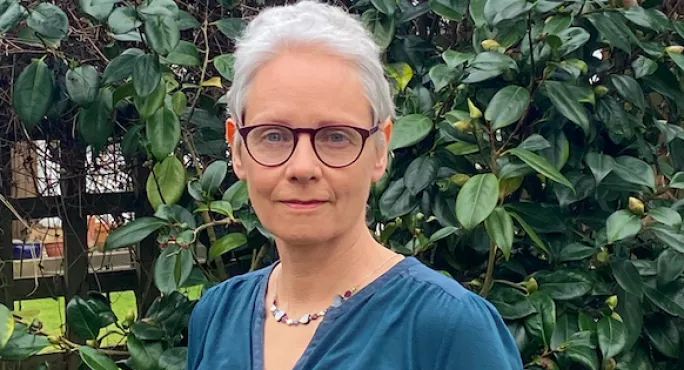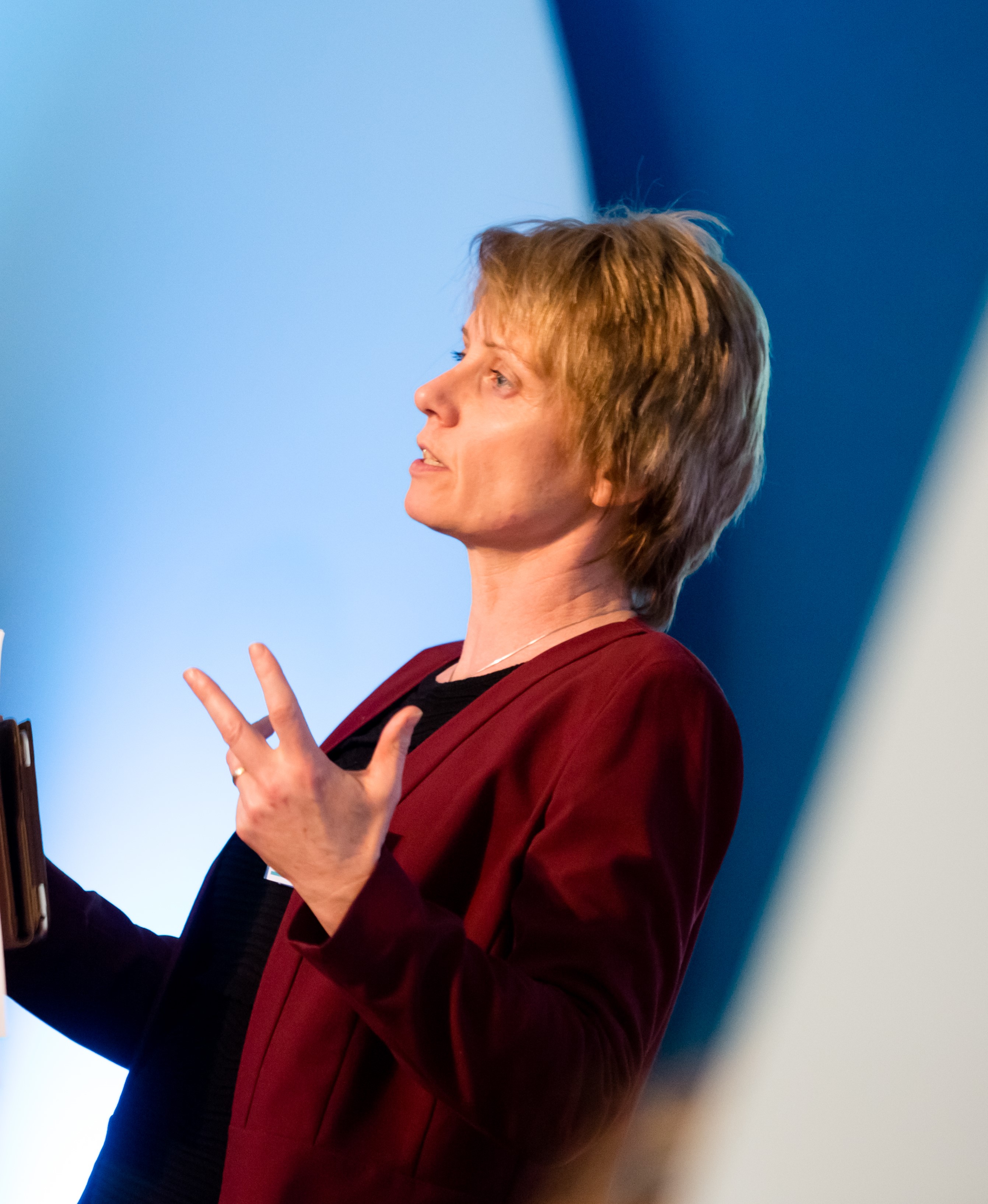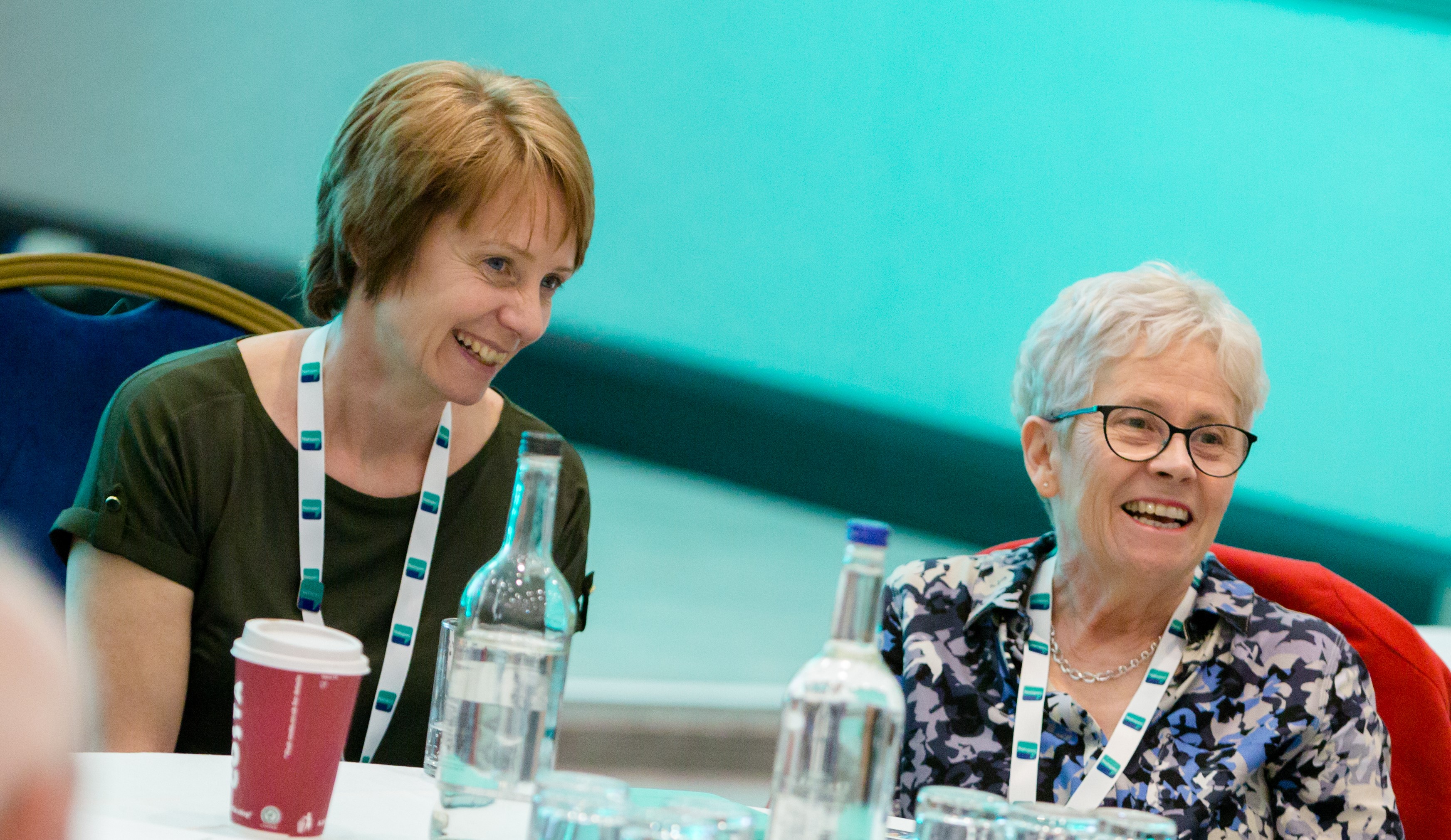Meet Clare Howard, the CEO who battled Covid and cancer

In January 2020, Clare Howard was looking for something big to happen. She’d been the chief executive of Natspec, the membership organisation for specialist colleges in the UK, for four years and was in need of a new challenge.
“I sat with Ruth Perry [senior policy manager at Natspec], and I said to her, ‘what we need is something to challenge us, something to bring about change. Otherwise, we could get bored’,” she says. “And then, coronavirus and cancer hit me - just what I needed.”
Howard laughs while she talks about this. For someone who has had, quite frankly, a hell of a year, she’s inspirationally upbeat.
In March last year, Howard found a lump in her breast and soon after was diagnosed with breast cancer. She’d had coronavirus herself a few weeks before - “I knew I’d lost my sense of smell when I couldn’t tell if the clothes my 16-year-old left over his bedroom floor needed to be washed or not,” she says - and her husband was recovering from it too. The country was gripped by Covid chaos, and specialist college staff were concerned for their students, many of whom are clinically vulnerable.
Being told you have cancer is terrifying at the best of times - but when the world is falling apart, surely it’s scarier than ever? For Howard, it was good timing.
“People say to me, ‘Oh god, you had cancer in the middle of coronavirus, oh, isn’t that awful?’ And it was, I’m not saying it wasn’t but [Covid] almost put my little problem into insignificance. There’s a global pandemic, there’s economic collapse, colleges are having to deal with the most vulnerable students with loads of different medical conditions: a learning disability in itself is a risk factor of death from coronavirus,” she says.
“Staff were under so much pressure, real intense pressure. And honestly, it made me not think about what was happening to me because I was having to be so amazed at how these guys kept going. It’s a bit odd to say but it was really good timing it happened at the same time.”
News: Post-16 high-needs system needs ‘radical shake-up’
More: Schools need to share SEND post-16 options, says report
Tes FE podcast: The growth in specialist colleges
Growing up female in the 1970s
Howard grew up in Croydon, London, and was surrounded by educationalists: her mother was a French teacher, and her father worked for the Inner London Education Authority (ILEA).
As a child, she was constantly jealous of her older brothers. “Growing up female in the 1970s and 1980s, you got stopped from doing everything. I was a bit of a rebel to be honest,” she laughs. She was a massive Crystal Palace supporter - and still is - and would regularly sneak off to watch the games without telling her parents.
“I was very angry with perceived injustices,” she says. “The boys seemed to have so much more fun. And the girls nowadays can have all the fun. My daughter has grown up wildly happy because she could get involved in everything she wanted to.”
It’s no surprise the subjects Howard enjoyed were the ones which bought out her competitive side - sports - and the ones in which she was allowed to argue - history and politics.
She went on to study history at university, and was on the path to training as a teacher, having already qualified as a swimming teacher and an outward bound teacher, when her dream job put a halt to it. Sport England were advertising for a lead regional officer for schools and colleges - and Howard knew she’d be the perfect fit.

For five years, Howard delivered PE, sport and activity resources to school and college staff and loved it. But half a decade in, she wanted a new challenge.
“I really do like change. Every time I need to change something: it’s either a new job or move house or have another baby or get a dog or whatever, it’s usually every three to five years, something big-ish has to change in my life,” she says.
And so, for the next 15 years, Howard had a range of job roles in sports education: she was the principal officer for the leisure strategy at Redbridge Council, she worked in consultancy at PMP consultancy - there she did projects with the Scottish Football Association, the Rugby Football Association and the Football Association in England - and went on to set up her own business, Prospects4Sport.
Championing the power of sport in FE
The business worked with colleges in East Midlands and the Skills and Education Group to coordinate networks to bring together mental and physical health initiatives with sport, and looked at how the sports curriculum and competitive sport could be brought together.
When the Association of Colleges put out a tender for a project called “The Future of Sport in Colleges”, it seemed an obvious fit for Propsects4Sport. For four years, she worked on the project, and when it came to presenting a report with a list of 55 recommendations, the AoC hired her to implement them as head of sport policy.
“Up until that point, the AoC was the best company I’d ever worked for. I already really loved colleges, loved the people, loved the environment, loved FE as a thing. It was the chance to go in and meet all these people who were so committed. I really loved that job,” she says.
To continue the legacy of Howard’s recommendations, AoC Sport was established, and she stepped up as deputy managing director - it was a role that allowed Howard to really champion the power of sport in colleges across the country.
“I convinced college principals that sport matters, not just for education, but for self-esteem, confidence and mental health and everything else that sport gives you. It’s not just about those who are on sports courses either: there’s the mechanics of sport, the design of sports material, it’s one of those things you can bring in any vocational area you want,” she says.
“We were advocates for sport, and what we had to try and do - and I think this is a good way of working generally - was not be cultish about it. You shouldn’t try and convince somebody sport is a good thing, because if you don’t like it, you’re not going to be convinced. If you’ve had a bad experience at school, or you think it is horrible to get sweaty or whatever, that’s not the argument to have. You need to do it the other way around and find out what their interests are, and then move your agenda around to those interests.”
Sticking for the underdog at Natspec
After half a decade at the AoC, Howard got the “five-year itch”. Throughout her career, she’s always loved sticking up for the underdog - so when the chief executive role at Natspec came up, it was as though her prayers had been answered.
“When I saw the job, it was like, ‘oh my god, all my wishes have come true’ because it’s a membership body, which I had so enjoyed working in, it was colleges, and it wasn’t in sport, which by then, I wanted to move away from. It felt like it was all the things I could stand up for and speak for and get passionate about,” she says.
“If further education is the forgotten bit of the education sector, then specialist colleges are definitely the forgotten bit of FE. Unfortunately, there is little value placed on that area of work, and it’s such an important area of work. I get fired up about sticking up for the underdog.”

Howard’s passion and admiration for specialist colleges really shines through. She talks about the variety of colleges: there’s one that operates out of portable cabins on industrial estates, others in boat sheds and pubs, and there are those who have a much more “FE” feel to them. The student cohorts differ massively too, she says - but what the colleges all have in common is the dedication of their staff.
“Throughout coronavirus, I’ve been completely, utterly blown away and humbled by what the staff have been through,” she says. “Seeing what others were going through with the pandemic, especially when our colleges were reporting deaths of staff or students, made it much easier to put my cancer treatment into perspective and helped me focus instead on dealing with coronavirus and colleges.”
Surviving cancer during a pandemic
And, in turn, many of them will have been blown away by Howard’s personal battle this year. Between long days of reading government guidance and offering advice to college leaders, she had an intense six-month course of chemotherapy and radiotherapy.
But Covid has its upsides, she says - for one, there was no traffic on the roads when she needed to go to appointments, and when she did arrive at hospital, there was no waiting around. And of course, working from home meant when she wanted to stay in her pyjamas and work from bed, she could.
“If I felt a bit rough one day and wanted to stay in my pyjamas in my laptop, everybody else was staying in their pyjamas with their laptop, weren’t they? So it didn’t make a difference. This is going to sound weird - Covid is a really horrible demon thing, but it kept chucking me benefits, throwing me sweets,” she says.
“When I had to have my operation they just started taking over the private hospital, so I had the bright shiny private hospital from a hospital, for my appointments. And then when you’re having chemotherapy in a normal year, you’re supposed to be really careful you don’t pick up coughs and colds because your immune system is so bad, but I didn’t have to be that careful this year because everybody else has been careful. There was hand sanitiser everywhere, and nobody came near you anyway. I said to my oncologist, ‘I actually feel safer in a coronavirus year than I would do otherwise, everyone is really clean’.”
Howard says the support she had from colleagues and members at Natspec was fantastic.
“The people at work, the board and the members, were just fantastic. I thrive off other people and just having chats with other people makes me feel better. I did a lot of walking and talking and chatting, and it’s incredible, whether it’s coronavirus, or funding reviews or structural change, the amount of benefit you can get just by sharing the networks of a membership body. And everyone was really great, really supportive,” she says.
For Howard, the past year has felt like cancer and Covid have been mingled together - “like they were doing some weird dance” - with each one coming to the forefront at different times. Overall, though, she says she’s “incredibly grateful” for the treatment she received when so many others were having a worse time.
The pandemic has taught us all things - and for Howard, after a year of highs and lows, she’s coming out the other end more patient, and more determined than ever to make the best out of a bad situation.
“I’m more patient than I was. There were highs and lows, some bits were really, really funny going through treatment and everything was happening at work. I’ve got stories about me vomiting out the window on people below and things like that, but one of the low points was when I thought I’d lost my identity,” she says.
“Basically, I thought I couldn’t be bothered to do anything, I didn’t know whether it was a side effect of cancer or a side effect of coronavirus. I thought I’d lost all my competitive spirit, my mojo, my ability to get excited and fight for things. And while that has come back, I’ve become a little calmer.
“I’m more concerned with direction of travel and less concerned with stumbling blocks, and more determined to make the best of bad situations. I’ve learned getting on and doing things are so much easier than thinking about doing them.”
You need a Tes subscription to read this article
Subscribe now to read this article and get other subscriber-only content:
- Unlimited access to all Tes magazine content
- Exclusive subscriber-only stories
- Award-winning email newsletters
Already a subscriber? Log in
You need a subscription to read this article
Subscribe now to read this article and get other subscriber-only content, including:
- Unlimited access to all Tes magazine content
- Exclusive subscriber-only stories
- Award-winning email newsletters